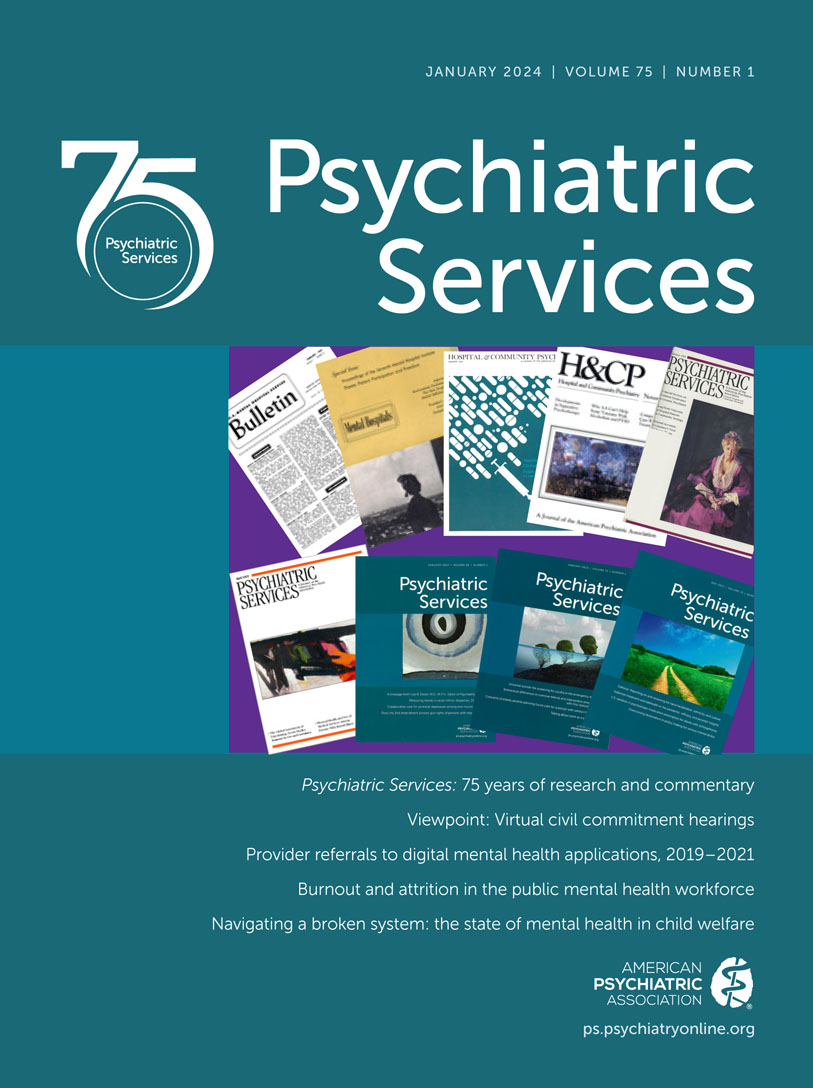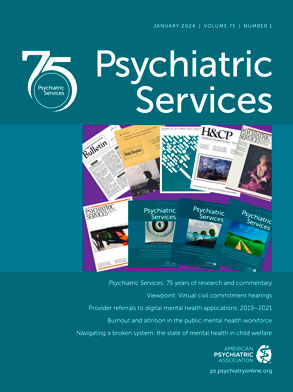Burnout and moral injury among Black psychiatrists and other Black mental health professionals are understudied. The increasing racial diversity in the United States calls for a more culturally responsive mental health workforce that provides equitable care. Black mental health professionals serve a vital role in expanding access to mental health services for Black and other marginalized communities; however, it is not their responsibility alone. The field of mental health, which includes institutions, corporations, professional organizations, and academic centers, has not done enough to develop a diverse and culturally knowledgeable workforce. For Black mental health professionals to be successful as clinicians, educators, researchers, or administrators, it is imperative to ensure their well-being. This endeavor requires that workplaces and professional organizations root out structural racism, which heightens stress for these professionals.
This column, coauthored by two psychiatrists, both Black women, addresses burnout and moral injury and highlights the impact of these adverse experiences on Black mental health professionals, including psychiatrists, psychologists, social workers, and other licensed mental health practitioners.
Burnout and Moral Injury
The concept of physician burnout, described as emotional exhaustion, depersonalization, and a sense of reduced personal accomplishment, is not fully understood as a syndrome (
1). Research on burnout and satisfaction with work-life integration has found that the proportion of physicians reporting burnout increased from 44% in 2017 to 63% in 2021 (
2). Analysis of burnout among Black mental health professionals has been limited. In 2020, Summers and colleagues (
3) published survey data of North American psychiatrists with a study sample that included more than 100 Black psychiatrists; however, details of their experiences were not reported. The Association of Black Psychologists, in collaboration with the Black Psychiatrists of America and the National Association of Black Social Workers, surveyed over 600 Black mental health professionals on the status of the Black mental health workforce. The survey report, published in 2022, indicated that, in the preceding 2 years, 28% of respondents considered leaving the mental health field because of burnout, inadequate financial compensation, heavy workloads, microaggressions and racism at work, and personal mental health challenges (
4).
Moral injury, the experience of conflict with one’s moral values, is often associated with high demands in health care that push physicians to render care in a manner that conflicts with their medical values and ethical commitments (
5,
6). We hypothesized that moral injury, as applied to Black mental health professionals, is a salient factor in workplace stress.
The Black Experience
In the United States, systemic racism and discrimination have pervasive consequences for mental and general medical health, housing, education, and employment of all Black people, including mental health professionals (
7). Weathering, which involves the accumulation of stress generated by racism over time, has a deleterious effect on Black individuals’ health and longevity (
8). Based on our personal and clinical experiences, racial mistreatment often intersects with gender bias, thereby compounding consequences for Black women. These types of challenges, driven by negative racial stereotypes, add complexity to the lives of Black mental health professionals. For most Black people, racial discrimination is persistent, irrespective of professional achievement. Under these circumstances, self-doubt and questioning of one’s competence place additional strain on Black professionals in workplaces.
Black mental health professionals experience racism and gender bias, both covert and overt, in their workplaces, contributing to stress and burnout. Some professionals may choose to remain in toxic settings, decathect, and experience negative health and career consequences. Others may exit these harmful environments in pursuit of greater autonomy and control in their professional lives. Such departures may be precipitous, in part related to increasing stress and strain and the need for immediate relief. These factors further diminish the availability of Black mental health professionals to serve in clinical roles or in institutional leadership.
Racism and Burnout
Black mental health professionals listen to and empathize with the mental health concerns and trauma emanating from Black communities. Simultaneously, these professionals carry the burden of their own experiences and traumas associated with being Black in America. Managing these struggles and bearing witness to the suffering of others in a racist system complicate Black mental health professionals’ work. Under these circumstances, they face high risks for vicarious trauma, overwork, compassion fatigue, and burnout. The following six examples illustrate the dynamics of racism and burnout.
Blocked Opportunities
As psychiatrists, we have worked for decades as leaders in academia, professional associations, for-profit and nonprofit organizations, corporate environments, and clinical practice. And as Black women, our experiences have been marked by challenges associated with our perceived differential treatment based on race and gender. We have grappled with blocked opportunities in which our achievements have been devalued, sometimes leading to preference being given to underqualified White colleagues. In addition to our personal experiences with this phenomenon, we are aware of numerous colleagues, both Black men and Black women, who have endured similar incidents.
We have accepted many invitations to speak at professional events or to serve on committees because of historical experiences of blocked opportunities for Black mental health professionals. We have done so not to augment our resumes but because we have felt a responsibility to be present in order to center the mental health needs of Black and other marginalized communities of color in decision making and to challenge the resistance of some White professionals to the merits of more equitable representation.
Tokenism
At times, we have been the sole Black psychiatrist in certain professional settings. This situation is an example of tokenism, in which the illusion of full inclusion and participation is presented to outsiders, when, in reality, it is a perfunctory act. In these environments, we were often invisible and discounted; still, we remained aware of the dynamics of our presence. One dilemma related to this circumstance is our moral responsibility to voice perspectives that are in line with our personal experiences related to racial identity and that challenge the cultural mainstream. This taking of responsibility can be an isolating experience, especially when our contributions are devalued and dismissed as not being germane to the discussion.
Minority Tax
The expectation to be involved in every initiative focused on diversity in an institution is an aspect of the “minority tax.” This experience is especially taxing when Black mental health professionals do not have the sphere of influence or authority to implement change. Although these professionals are aware of the need to incorporate diversity into programs, they understand that such initiatives often lack sufficient financial and human resources to be successful. The additional responsibilities associated with the minority tax may interfere with meeting other personal and professional obligations and ultimately become burdensome and detrimental to career advancement.
Moral Injury
Even with widespread knowledge about the importance of addressing racial disparities in health care, Black mental health professionals who speak up about inequities face significant risk for increased adversity. For example, after we reported on racial treatment inequities in mental health settings, we have been criticized, and our credibility was questioned. We were sometimes regarded as disruptive forces or threats to team cohesion. When one of us proposed a solution to address these disparities, the offer was met with skepticism, and eventually, the workplace became toxic and untenable. Colleagues withdrew their support, which caused further marginalization and isolation. This perceived mistreatment appeared to be racially motivated; however, it is exceedingly difficult to substantiate perceptions about colleagues’ motivations.
Microaggressions
We have had numerous encounters in which White colleagues mistook us for other women who were Black or from other non-White racial backgrounds. In one instance, a White male colleague insisted that one of us was late in providing him with a deliverable. However, this was a case of mistaken identity. The colleague did not recognize that he had originally requested the deliverable from another woman who was not a psychiatrist and who had no physical resemblance to the coauthor of this column other than being Black. This example illustrates how a microaggression can obscure personhood and render someone invisible. In another interaction with a White colleague, one of us was asked, “Why are you dressed up all the time?” The author responded that dressing professionally minimizes the chance of being misidentified as a housekeeper. Because of these racial biases, we were raised to always maintain appropriate dress. However, professional attire does not always prevent the assumption, based on powerful racial stereotypes, that Black people occupy service roles. In another example, one of us, on arriving at an exclusive professional meeting, was questioned about her presence, despite being invited by the president of the organization. In each of the preceding scenarios, we first questioned ourselves about whether we were at fault for our colleagues’ false assumptions (
7). These episodes were emotionally draining, engendering a multitude of feelings, ranging from embarrassment to anger.
Racial Battle Fatigue
The layering of stressful work situations in professional environments over time contributes to racial battle fatigue (
9). This theoretical concept refers to psychosocial, psychological, physical, and behavioral responses triggered by “the oppressive systemic conditions of racism” (
9). Racial battle fatigue may lead to significant health consequences, such as hypertension, anxiety, depression, and other symptoms associated with burnout. We are aware of several prominent Black psychiatrists who have resigned their memberships in national psychiatric organizations because of the accumulation of blocked opportunities, racial insults, and disrespectful treatment (
4). Black mental health professionals who work in toxic settings in which harmful racial practices are pervasive may choose to leave their workplaces to seek respite, greater fulfillment in their careers, and improved work-life balance. Remaining in these environments places Black mental health professionals at risk for adverse health consequences.
Strategies for Supporting Black Mental Health Professionals
To serve Black communities and other communities of color with culturally appropriate care, workplaces must prioritize the elimination of racism and racial bias, which contribute to burnout among Black mental health professionals. It is important to continue to raise awareness of these negative forces and provide opportunities for Black mental health professionals in leadership and decision-making roles. We recognize that having Black mental health professionals in leadership roles does not guarantee optimal care, nor does it shield them from racism.
Organizations must continually evaluate their missions and prioritize the needs of the communities they serve. Strategies for addressing burnout should include institutionalizing protective factors in the workplace that foster respect and dignity and cultivating vocal professionals (“upstanders”) who will voice their concerns and interrupt racial abuse and maltreatment when they occur (
10). It is imperative that institutions establish policies and systems to guard against abuse and burnout among all mental health practitioners, particularly practitioners of color. Networks of collegial support can facilitate Black mental health professionals in processing racially fraught situations and formulating appropriate responses.
Other avenues of support for Black mental health professionals to prevent burnout include healing circles in local communities; national professional societies, such as the American Psychiatric Association Caucus of Black Psychiatrists, Association of Black Psychologists, Black Psychiatrists of America, National Association of Black Social Workers, and National Medical Association; and civic, social, and religious organizations. These resources can provide networks of camaraderie and collegiality that are essential for professional well-being and development and can guard against marginalization and isolation. These preventive strategies offer protection to the personal and professional well-being of Black mental health professionals as they continue to be challenged at organizational, systemic, and cultural levels (
6).

